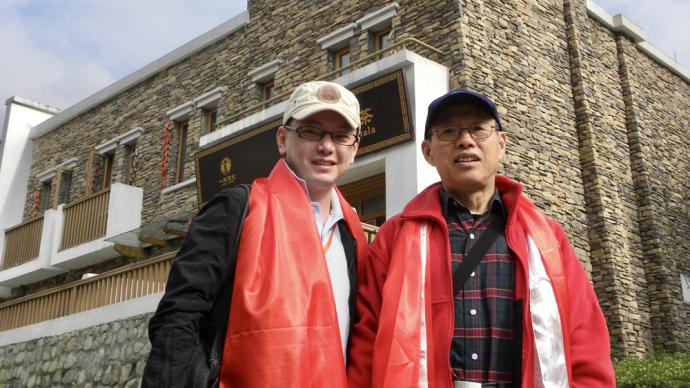
In the early morning of May 7, performance artist Mr. Liu Zifeng died in Shanghai at the age of 83. In an exclusive interview with The Paper, Ishi Chuan, vice-chairman of the Shanghai Film Association and professor of the Shanghai Theater Academy, mentioned that Liu Zifeng was fascinated with calligraphy in his later years, and his strokes were very unrestrained. The eyes of the sun and the moon, and the hearts of sages and sages in ten thousand volumes of poetry and books! I think this sentence can't be more accurate to describe Teacher Zifeng's personality and conduct."
After graduating from the Performance Department of the Shanghai Theater Academy in 1963, Liu Zifeng joined the China Welfare Institute Children's Art Theater as an actor. In his words, "crossing Huashan Road, I came to Children's Art, and then it was my whole life." In 1965, his debut film "Little Football Team" sounded like a children's film. For many audiences born in the 1970s and 1980s, Liu Zifeng, who wears glasses, always has a sincere and humorous face. He has a simple and honest personality and occasionally shows wit, and his gentle screen image is vague but unforgettable.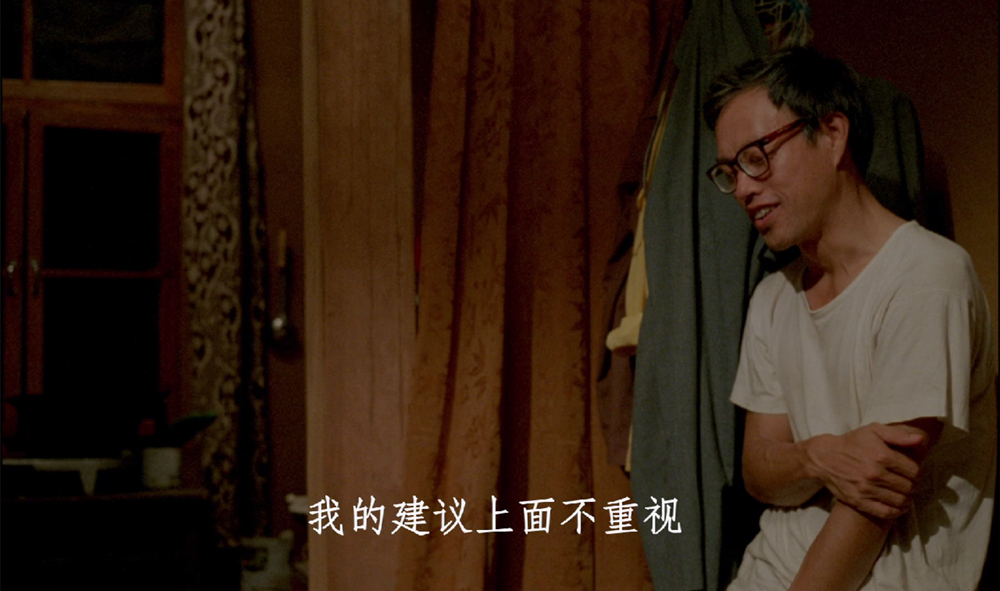
In 1985, 47-year-old Liu Zifeng starred in the movie "Black Cannon Incident". With his role as engineer Zhao Shuxin in the film, he won the Best Actor in the 6th Chinese Film Golden Rooster Award. In Ishikawa's view, "Black Cannon Incident" was a very important film work in the 1980s, "its artistic and social value is actually underestimated. When later generations mention the breakthrough of the fifth generation directors in the 1980s, they often It is the rural and historical scenes in "The Yellow Earth" and "Red Sorghum", but the breakthrough of these works is mainly in the form of art. In terms of social criticism, "Black Cannon Incident" is undoubtedly the most avant-garde spirit."
Specifically, "Black Cannon Incident" reflects two directions: the first is the art form. Director Huang Jianxin had just made a film at that time and was still in the period of artistic exploration. His works have distinct modern characteristics, although the discussion is about social topics. , was a very mainstream reform topic at that time, but it was extremely personal in the presentation of artistic style. "He even used the elements of anti-special films that Chinese audiences were familiar with before to achieve an ironic effect."
"I am deeply impressed by the visual form of the film, which often uses unconventional symmetrical composition. The conference room in the film is very symmetrical on the left and right, and a large wall clock hangs in the middle of the picture, which has the effect of a decorative painting. The bureaucracy in the society at that time was unhealthy, and under the traditional system, people were too busy and inefficient. In general, it was in line with the visual expression breakthrough of the fifth generation of directors - emphasizing film as an audio-visual art. ontology," Ishikawa said.
In Ishikawa's view, "Black Cannon Incident" once pushed the special charm of video elements to the extreme, making full use of space, color, sound, movement, performance and other elements that distinguish films from other artistic styles, "Director Huang Jianxin actually constructed a It is an absurd picture of urban life and gives the whole film a 'meaningful form'. For example, in terms of sound, I remember a construction site scene where a lot of electronic noise was used in the background music, including the popular music of the year 'Ali' , Ali Baba, Ali Baba is a happy young man', all with the distinct imprint of that era."
In terms of film content, Huang Jianxin's thinking is undoubtedly very advanced. "The reflection of the fourth and fifth generation directors on society often focuses on the relationship between the individual and the system, emphasizing that the system shackles the creativity of the individual, and emphasizes the conflict between people and the system, and between people and the external environment. The most typical, Mo More than Chen Kaige's "Grand Parade", the military parade emphasizes uniformity, and individual differences must be smoothed out. And Huang Jianxin's brilliant point is that the criticism reflected in "Black Cannon Incident" is two-way." Ishikawa said, "In addition to pointing to the system, it also points to the inner conservatism and rigidity of everyone in the film. He keenly sees that people's internal spiritual factors and external institutional factors together constituted obstacles to reform in that year. The greatness of this film lies in this."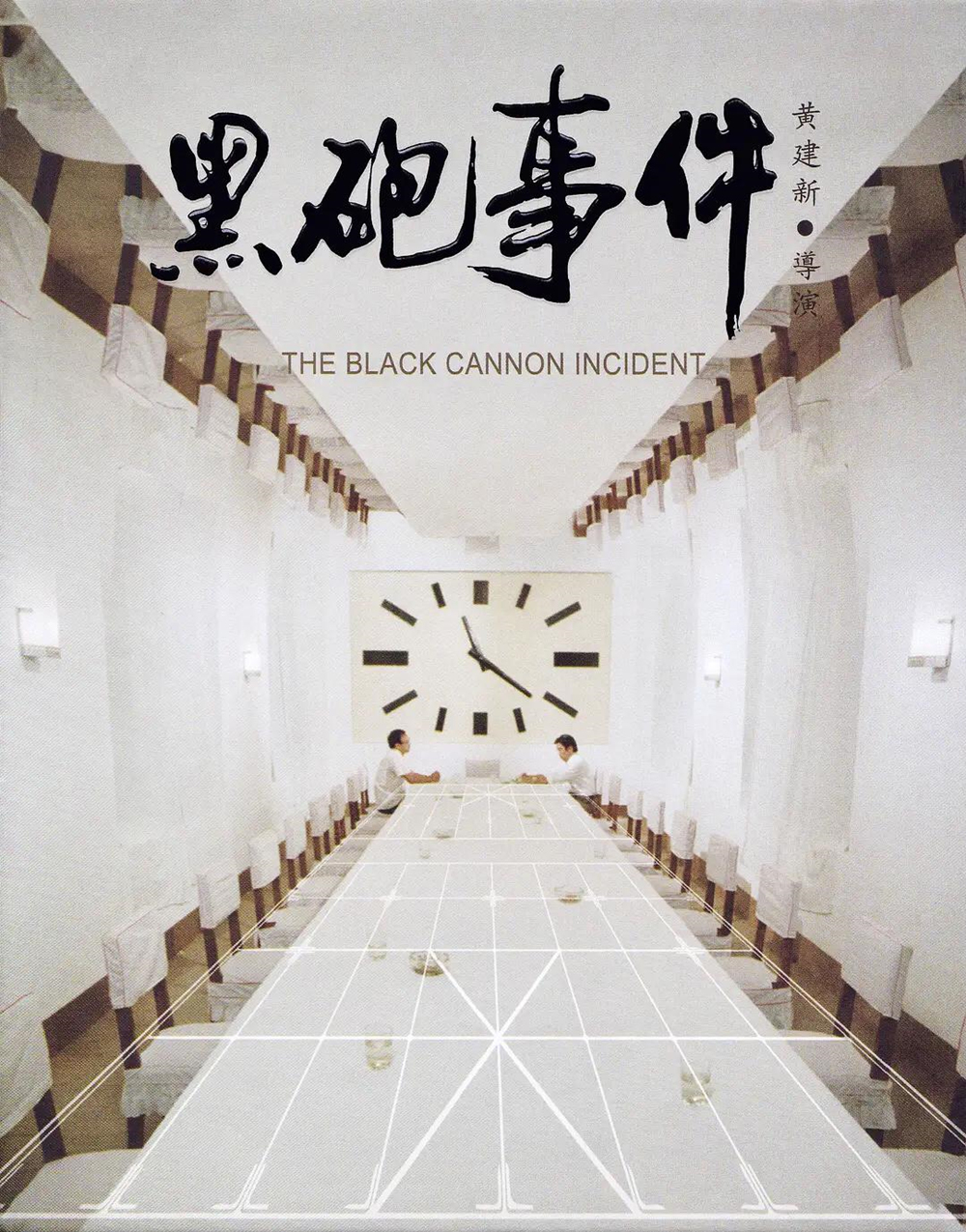
"Black Cannon Incident" is undoubtedly a reflection film, but it has changed from the adaptation of "Scar Literature" at the beginning of the reform and opening up, "Previous films often adopted the method of 'moral replacement', as if the 'Gang of Four', the extreme left The characters in the film are all bad guys, while the intellectuals are all oppressed good people. A more profound reflection is gradually unfolded in the fourth and fifth generation directors, but when it comes to "Black Cannon Incident", it presents a completely different mental structure."
"The Zhao Shuxin in the movie is undoubtedly the victim of the whole incident, but is he okay?" Ishikawa asked rhetorically. "On the one hand, Zhao Shuxin has the enthusiasm to devote himself to construction, but at the same time he is easy to be gullible, follow others' opinions, and lacks his own judgment. In a deep sense, he brings out the servility of traditional intellectuals in his bones, and he lacks the independent personality and criticism of intellectuals. thinking."
At that time, Liu Zifeng came to play Zhao Shuxin in the film, which was made in heaven and the right actor was chosen. "His appearance is ordinary. Similar images can be found in major scientific research institutions in China. He wears a pair of black-rimmed glasses and a briefcase. He is walking on the road in a hurry, and no one will look at him. At a glance. He doesn't look like an elite intellectual, but he just fits the character's honest and honest, somewhat dull, naive, and submissive character setting."
Ishikawa recalled that in the 1980s, the concept of performance was updated. In the past, performances on the stage of dramas required clear meanings, and the characters’ personalities and inner activities should be externalized clearly, and they should be told to the audience as they are, so that people can see at a glance. "With the rise of modern cinema, an important point of view is that the inner world of man is unknowable. Sometimes, just out of an accidental reaction or an ambiguous flash of thought, there is no logic and no clear motivation to speak of. Yes. Human behavior, indeed, often does not need rational thinking support."
The so-called "fuzzy performance" means that the actor "generally" provides a mental state in life. As for what he is thinking about? Different audiences can have different interpretations, and it is not necessary to provide a clear answer for the audience. Liu Zifeng's performance in "Black Cannon Incident" is the culmination of this. "The fuzzy performance he emphasizes is to enrich the inner world of the characters as much as possible. The audience may not be sure what he wants to do and what he wants, but He provides a kind of 'presence' that keeps people's attention on him. This is very different from the old stage performance paradigm of blowing beard, staring, chest and head up. It has a lot more content, although it may be a little unclear. , unknown."
Zhong Liandi, a Chinese literary critic and theorist of film aesthetics, once pointed out that Zhao Shuxin's character is an image of reflection. "Actually, Mr. Zhong also mentioned that the movie should show the rough edges of life. Life is not as sharp as cutting on a lathe, and life itself is rough. On this point, Liu Zifeng contributed to the "Black Cannon Incident". It's a textbook performance," Ishikawa said.
Good Actor, "Sensitive and Rich Inner World"
In the interview, Ishikawa also recalled his interactions with Liu Zifeng. "Actually, I first learned about Mr. Zifeng from Director Xie Jin." In 1992, Liu Zifeng was invited to star in the film "The Star" directed by Xie Jin, in which he played the hero Xie Changgeng, a cancer-stricken man. Father, pulling his mentally handicapped son alone.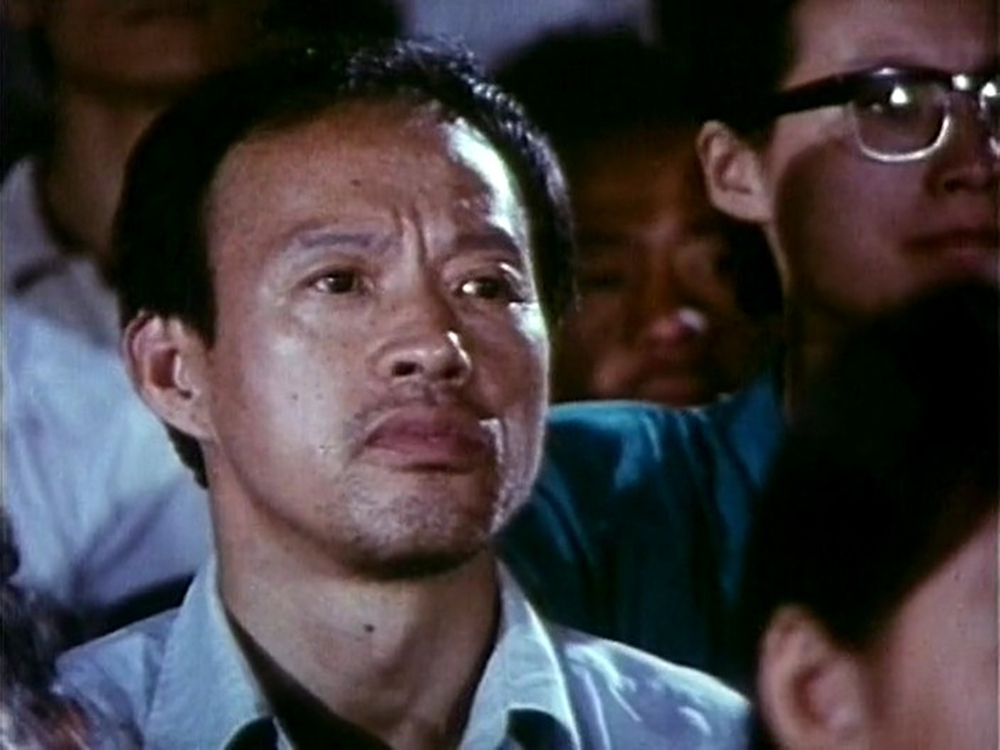
On this point, director Huang Jianxin posted his condolences in the circle of friends at noon today, which can also be proved. "I was saddened to hear the news of Zifeng's death, and I couldn't help shedding tears... Zifeng is the protagonist of "Black Cannon Incident" and "Dislocation". With his extraordinary acting ability, he has created a permanent artistic image for Chinese films. 1985 and 1986 were the moments when our young creative team tried their best to move forward. Zifeng worked hard with us to inject soul into these two films... great credit. I miss Zifeng!"
From Ishikawa's point of view, Liu Zifeng has a kind of gentleness, kindness, respect and prudence in his body, "I have known Mr. Zifeng for almost 20 years. There were two 'close connections', once when we went to Jiangyin to participate in the film festival, and we boarded the first Antarctic scientific research ship together. Visiting, drinking the blue of the sea with the officers and soldiers... In fact, he is always naive, as if nothing matters, but his heart is very delicate and even a little fragile."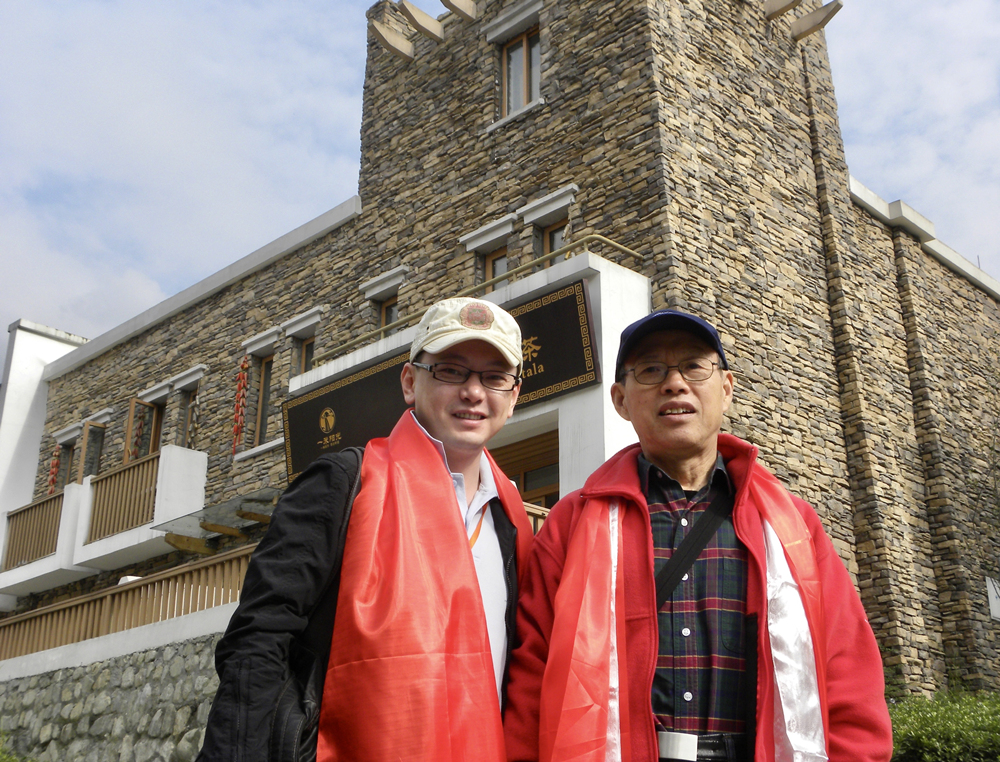
After graduating from the Performance Department of the Shanghai Theater Academy in 1963, Liu Zifeng joined the China Welfare Institute Children's Art Theater as an actor. In his words, "crossing Huashan Road, I came to Children's Art, and then it was my whole life." In 1965, his debut film "Little Football Team" sounded like a children's film. For many audiences born in the 1970s and 1980s, Liu Zifeng, who wears glasses, always has a sincere and humorous face. He has a simple and honest personality and occasionally shows wit, and his gentle screen image is vague but unforgettable.

"Black Cannon Incident" stills, Liu Zifeng as Zhao Shuxin
The most "avant-garde" "Black Cannon Incident"In 1985, 47-year-old Liu Zifeng starred in the movie "Black Cannon Incident". With his role as engineer Zhao Shuxin in the film, he won the Best Actor in the 6th Chinese Film Golden Rooster Award. In Ishikawa's view, "Black Cannon Incident" was a very important film work in the 1980s, "its artistic and social value is actually underestimated. When later generations mention the breakthrough of the fifth generation directors in the 1980s, they often It is the rural and historical scenes in "The Yellow Earth" and "Red Sorghum", but the breakthrough of these works is mainly in the form of art. In terms of social criticism, "Black Cannon Incident" is undoubtedly the most avant-garde spirit."
Specifically, "Black Cannon Incident" reflects two directions: the first is the art form. Director Huang Jianxin had just made a film at that time and was still in the period of artistic exploration. His works have distinct modern characteristics, although the discussion is about social topics. , was a very mainstream reform topic at that time, but it was extremely personal in the presentation of artistic style. "He even used the elements of anti-special films that Chinese audiences were familiar with before to achieve an ironic effect."
"I am deeply impressed by the visual form of the film, which often uses unconventional symmetrical composition. The conference room in the film is very symmetrical on the left and right, and a large wall clock hangs in the middle of the picture, which has the effect of a decorative painting. The bureaucracy in the society at that time was unhealthy, and under the traditional system, people were too busy and inefficient. In general, it was in line with the visual expression breakthrough of the fifth generation of directors - emphasizing film as an audio-visual art. ontology," Ishikawa said.
In Ishikawa's view, "Black Cannon Incident" once pushed the special charm of video elements to the extreme, making full use of space, color, sound, movement, performance and other elements that distinguish films from other artistic styles, "Director Huang Jianxin actually constructed a It is an absurd picture of urban life and gives the whole film a 'meaningful form'. For example, in terms of sound, I remember a construction site scene where a lot of electronic noise was used in the background music, including the popular music of the year 'Ali' , Ali Baba, Ali Baba is a happy young man', all with the distinct imprint of that era."
In terms of film content, Huang Jianxin's thinking is undoubtedly very advanced. "The reflection of the fourth and fifth generation directors on society often focuses on the relationship between the individual and the system, emphasizing that the system shackles the creativity of the individual, and emphasizes the conflict between people and the system, and between people and the external environment. The most typical, Mo More than Chen Kaige's "Grand Parade", the military parade emphasizes uniformity, and individual differences must be smoothed out. And Huang Jianxin's brilliant point is that the criticism reflected in "Black Cannon Incident" is two-way." Ishikawa said, "In addition to pointing to the system, it also points to the inner conservatism and rigidity of everyone in the film. He keenly sees that people's internal spiritual factors and external institutional factors together constituted obstacles to reform in that year. The greatness of this film lies in this."

"Black Cannon Incident" poster
"Fuzzy Show", textbook acting"Black Cannon Incident" is undoubtedly a reflection film, but it has changed from the adaptation of "Scar Literature" at the beginning of the reform and opening up, "Previous films often adopted the method of 'moral replacement', as if the 'Gang of Four', the extreme left The characters in the film are all bad guys, while the intellectuals are all oppressed good people. A more profound reflection is gradually unfolded in the fourth and fifth generation directors, but when it comes to "Black Cannon Incident", it presents a completely different mental structure."
"The Zhao Shuxin in the movie is undoubtedly the victim of the whole incident, but is he okay?" Ishikawa asked rhetorically. "On the one hand, Zhao Shuxin has the enthusiasm to devote himself to construction, but at the same time he is easy to be gullible, follow others' opinions, and lacks his own judgment. In a deep sense, he brings out the servility of traditional intellectuals in his bones, and he lacks the independent personality and criticism of intellectuals. thinking."
At that time, Liu Zifeng came to play Zhao Shuxin in the film, which was made in heaven and the right actor was chosen. "His appearance is ordinary. Similar images can be found in major scientific research institutions in China. He wears a pair of black-rimmed glasses and a briefcase. He is walking on the road in a hurry, and no one will look at him. At a glance. He doesn't look like an elite intellectual, but he just fits the character's honest and honest, somewhat dull, naive, and submissive character setting."
Ishikawa recalled that in the 1980s, the concept of performance was updated. In the past, performances on the stage of dramas required clear meanings, and the characters’ personalities and inner activities should be externalized clearly, and they should be told to the audience as they are, so that people can see at a glance. "With the rise of modern cinema, an important point of view is that the inner world of man is unknowable. Sometimes, just out of an accidental reaction or an ambiguous flash of thought, there is no logic and no clear motivation to speak of. Yes. Human behavior, indeed, often does not need rational thinking support."
The so-called "fuzzy performance" means that the actor "generally" provides a mental state in life. As for what he is thinking about? Different audiences can have different interpretations, and it is not necessary to provide a clear answer for the audience. Liu Zifeng's performance in "Black Cannon Incident" is the culmination of this. "The fuzzy performance he emphasizes is to enrich the inner world of the characters as much as possible. The audience may not be sure what he wants to do and what he wants, but He provides a kind of 'presence' that keeps people's attention on him. This is very different from the old stage performance paradigm of blowing beard, staring, chest and head up. It has a lot more content, although it may be a little unclear. , unknown."
Zhong Liandi, a Chinese literary critic and theorist of film aesthetics, once pointed out that Zhao Shuxin's character is an image of reflection. "Actually, Mr. Zhong also mentioned that the movie should show the rough edges of life. Life is not as sharp as cutting on a lathe, and life itself is rough. On this point, Liu Zifeng contributed to the "Black Cannon Incident". It's a textbook performance," Ishikawa said.
Good Actor, "Sensitive and Rich Inner World"
In the interview, Ishikawa also recalled his interactions with Liu Zifeng. "Actually, I first learned about Mr. Zifeng from Director Xie Jin." In 1992, Liu Zifeng was invited to star in the film "The Star" directed by Xie Jin, in which he played the hero Xie Changgeng, a cancer-stricken man. Father, pulling his mentally handicapped son alone.

"The Star" stills
"Actually, this plot and Mr. Xie Jin's personal life experience have some reflections, and the performance is also the director's own anxiety and worry. At that time, Liu Zifeng joined the group relatively late, but boldly put forward a suggestion: all the mentally handicapped in the film. All the children's images are replaced by mentally handicapped children in life. Of course, this was opposed by some people in the crew. They have already formed a group and selected the actors. Now it all has to be overturned. But Xie Jin appreciates this suggestion very much. , make a decision immediately, and do it like this." In Ishikawa's view, this just reflects the experience and skill of the old actors. "On the set, they often cherish each other. The director makes a plan, and Teacher Zifeng can provide it immediately. There are so many ways to act, 'Hey, can you see me acting like this? Or, I can act like this.'"On this point, director Huang Jianxin posted his condolences in the circle of friends at noon today, which can also be proved. "I was saddened to hear the news of Zifeng's death, and I couldn't help shedding tears... Zifeng is the protagonist of "Black Cannon Incident" and "Dislocation". With his extraordinary acting ability, he has created a permanent artistic image for Chinese films. 1985 and 1986 were the moments when our young creative team tried their best to move forward. Zifeng worked hard with us to inject soul into these two films... great credit. I miss Zifeng!"
From Ishikawa's point of view, Liu Zifeng has a kind of gentleness, kindness, respect and prudence in his body, "I have known Mr. Zifeng for almost 20 years. There were two 'close connections', once when we went to Jiangyin to participate in the film festival, and we boarded the first Antarctic scientific research ship together. Visiting, drinking the blue of the sea with the officers and soldiers... In fact, he is always naive, as if nothing matters, but his heart is very delicate and even a little fragile."

On September 24, 2011, Ishikawa (left) took a group photo with Liu Zifeng during a return visit to the Shanghai-aided project in Yingxiu.
In 2011, Shanghai assisted the construction of Yingxiu Town—in the 2008 Wenchuan earthquake, the reconstruction of Yingxiu Town, the epicenter, was supported by Shanghai counterparts—at that time, Ishikawa and Liu Zifeng visited Yingxiu Town together as representatives of Shanghai’s literary and art circles, and mentioned In the experience of starring in "Qing Xing", there was a scene where Xie Changgeng was lying in bed worrying about his life, "Teacher Zifeng shed tears when he was talking, and later burst into tears in public. In the public, I became a junior. I was really at a loss, and I didn't know what to do... At that time, he was already a 70-year-old gentleman, which shows that a good actor has a very sensitive and rich inner world."Related Posts